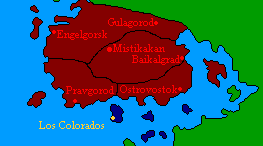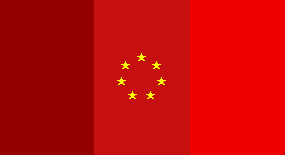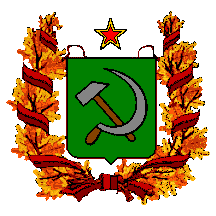Mistikal
| Mistikali Federated Socialist Republic
| |||
| |||
|
Motto: "Revolution, Socialism, Equality" | |||
| Anthem: Motherland
| |||

| |||
| Map versions | 6.6.9-6.7.1
| ||
| Capital | Mistikakan | ||
| Largest city | Engelgorsk, Gulagorod
| ||
| Official language(s) | English, Russian
| ||
| Demonym | Mistikali | ||
| - Adjective | Mistikali
| ||
| Government | Socialized Communism | ||
| - Premier | none | ||
| - Premier | Red Cyberian | ||
| - Legislature | Politburo
| ||
| Establishment | July 23, 2003 | ||
| -Ranked | NA | ||
| Area | ... km² | ||
| - Ranked | NA
| ||
| Population | 2 | ||
| - Active | 0 | ||
| - Ranked | NA
| ||
| Currency | Ruble
| ||
| Abbreviation | MKS
| ||
| National website | none | ||
| National forum | none
| ||
| National animal | Siberian Husky | ||
| National food | Caviar | ||
| National drink | Vodka | ||
| National tree | Pine | ||
The Mistikali Federated Socialist Republic, or simply Mistikal, was a Soviet-themed micronation founded in July of 2003 as a breakaway state from the fascist micronation of Engelvania. It existed briefly on Eura before being disbanded about a year later. It had a brief resurgence in 2005 with a democratic makeover, but this too ultimately failed and the nation was completely disbanded later that same year. Mistikal is notable for being the result of a covert operation led by Noviykrazniystan and as one of the best examples of effective micronational warfare between two states. Thematically, it was based on Leninist Russia between 1917-1924 and, more specifically, on the brief revolutionary state of the Far East Republic.
History
The Soviet Republic of Engelvania was a fascist micronation that came into contact with Noviykrazniystan and immediately began making threats and issuing a declaration of war. Besides a few attempts to spam and hack the RNK's forum, the Engelvanians proved no serious threat but continued to spout fascist propaganda and generally annoy people. RNK forces then secretly launched a covert operation against Engelvania, installing a sock puppet known as Red Cyberian as a citizen, who then proceeded to work his way into a position of power as Premier of Mystikal Province and perform a coup. The coup partially succeeded, and the result was that Engelvania splintered into civil war, one side comprised of the remaining fascists and the other known as Mistikal. The two sides fought a protacted war between July and December of 2003, with Mistikal acting as the RNK proxy power, which eventually resulted in Engelvania's destruction. After this point Mistikal had served its purpose and most were inclined to simply disband it, but Red Cyberian decided to pursue it as an independent project. However unique, Mistikal failed to gain much attention and was eventually disbanded for lack of activity. Mistikal is notable for being a highly developed nation in terms of culture and symbolism, despite being a relatively small, one-man project.
Fictional History
This fictional history was written in 2003 as a backstory to Mistikal.
The early years of Mistikal can be summed up by a relative comparison to George Orwell's famous novel '1984'. In that novel, three brutal totalitarian communist states ruled over the entirety of the Earth; Oceania, Eurasia and Eastasia. Ever in famine, ever in poverty, ever in war, and ever in repression. This was daily life for the Mistikali some three years ago (see time scale) when they were a part of the evil Soviet Republic of Engelvania. The Engelvanians were a tyrannical group who enjoyed obscene sadistic lives. And at the time Mistikal (spelled Mystikal in Engelvanian) was a large prison camp for political activists. The cities of Mistikakan and Gulagorod had been built around the ever-growing prison facilities. But the prisons had become so large, and so much of the population had been declared "dissident" that the Engelvanians could no longer control them. The Mistikalis began to form underground resistance groups. Tunnels were dug under the prisons and escape routes planned.
The majority of the resistance was organised by Vladimir Kiberski, a political prisoner sentenced to work in the uranium mines. Working with other resistance fighters, Kiberski began using his knowledge of mining techniques to lay out a whole network of a literal underground railway. Kiberski's Mistikali Freedom Brigade began leading insurget revolts against the Engelvanians. At first, only small pockets were revealed, testing the strength of the pompous Engelvanian forces. Finally, on August 3rd, 1960, Kiberski ordered the full-scale revolution to begin. The 1st Great Patriotic War, as it became known, threw all of Engelvania into anarchy as Mistikali liberation forces spread across the countryside. The Red Army, at this time still mostly guerilla and partisan fighters, waged constant war against the mock-Soviet forces of the Engelvanians. Unable to stem the tide of the vast revolution, the Engelvanians began to crack. By November of 1960, the Engelvanians were forced to withdraw from Mistikal. On January 3rd, 1961, at the historic battlefield outside Orlock Palace, Premier Kiberski signed the decleration of independence. Realizing the dream of millions, the Mistikali Federated Socialist Republic was born that day.
In the weeks following independence, the Red Army pushed the Engelvanians out of Pravdastan and Sovietski, the two coastal republics, forcing them to retreat to their strongholds in Engelvania Mons. The greatest battles of the 1st Great Patriotic War were to be seen on the fields outside of Gulagorod and Yurigrad. Mistikali T-55 brigades clashed with Engelvanian Panzers on the slopes of the October Mountains. Villages were turned into bloodbaths as guerillas occupied homes and began sniping down eachother. Mechanized vehicles ambled along through mud-filled roads while the crack of artillery fire sounded overhead. Yet despite high casualties, the Engelvanians were slowly giving way to the vast numerical superiority of the Red Army. In early June, as the wet spring turned to a dry summer, the Red Army made a massive offensive into Gulagorod, taking the long-besieged city in less than a month. By the time next spring came around, January 1962, the Engelvanians had been reduced to sporadic pockets of militant fighters. By the end of the year, the Soviet Republic of Engelvania had been completely crushed and Premier Kiberski declared Mistikal victorious.
Since that time, nearly a full year has passed. Engelvania is no more, but in it's place has risen the imperialist terrorist organization known as the Brotherhood of Anarchy. While the Red Army stretches it's resources to maintain security over all of Mistikal, BoA has caused some problems with by detonating bombs and making random attacks, all the while claiming a "Return of the Empire" when it is little more than an atamanschina. Premier Kiberski has worked to reform the Socialist Republic into a more democratic body, delegating much of the executive and legislative powers he once held as provisional commander of the revolution, to the Politburo and Supreme Soviet. Today, Mistikal stands as a beacon to the people. Defiant against those who would repress the proletariat and united in the common goal of progress towards the true worker's paradise.
Government
Mistikal is a democratic commune in which every citizen has a voice in the affairs of the government. The Premier, Commissars and SSR Commandants comprise the Politburo, the Mistikali equivalent of an executive council. The Politburo can make executive decisions during times of war and peace that require decisive action, rather than slower legislature. But most government powers are vested in the Supreme Soviet, an open democratic council where all Mistikali citizens may propose and vote on legislature. Both the Politburo and Supreme Soviet need only attain 2/3rds majority votes in order to pass a motion. The Premier holds veto power over the Supreme Soviet, but may himself be vetoed by a majority vote of the Politburo. The Premier cannot veto decisions made by the Politburo. The Politburo may also use a majority vote from them to veto a measure from the Supreme Soviet. All positions, including that of the Premier, are elected by public ballot, with the winner being he or she who obtains the most votes. All terms last a period of six (real) months. In the event of a tie, the winner is determined by the courts.

